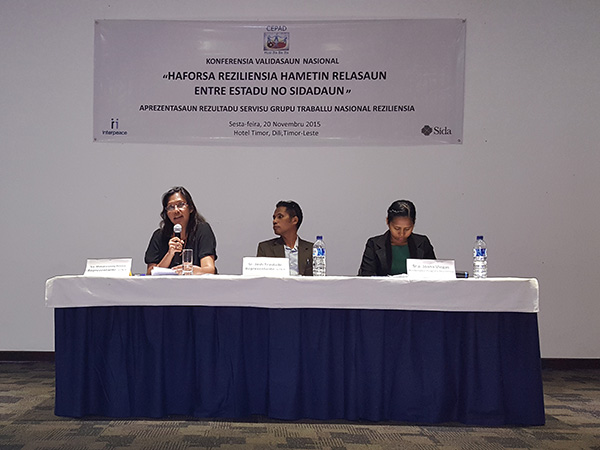National Working Group on resilience presents its Policy Recommendations in Dili

A more effective national Strategy on Civic Education can foster greater resilience for Peace in Timor-Leste
The National Working Group on Resilience (NWG-R) presented its proposal to establish a National Commission on Civic Education to almost 100 stakeholders from government, civil society, rural communities and international actors during a Validation Workshop held at Hotel Timor, Dili on Friday November 20th, 2015.
The policy proposal and action plan to establish a National Commission for Civic Education is based on the working group’s belief that better coordination of already existing civic education initiatives will go a long way towards improving state society relations, and as a result will make Timorese society more resilient for peace.
Defining civic education as the “processes that use critical thinking to encourage people to apply their values, beliefs and capacities as members of communities in order that they become active citizens, hold their government to account and organize themselves to bring about positive change in society”, the members’ proposal aims to support an active population with the capacity for critical reflection and the motivation to hold leaders to account and take the initiative to implement positive changes in society.
Timorese people from all thirteen municipalities were consulted on their understanding of resilience through focus group discussions and a national survey. The findings reveal that culture, religion, law and security as well as leadership constitute the basic pillars of Timor-Leste’s resilience to violent conflict. It was noted however that the ways in which each of these elements are used and applied by different actors in society determines whether there is greater or lesser resilience for peace in the country. Following the consultation process, the National Working Group on Resilience was convened as an independent body mandated with the task of developing recommendations for strengthening resilience in Timor-Leste.
Meetings were held regularly from June to November 2015 with support and facilitation from the Centre for Studies for Peace and Development (CEPAD), who had led the initial consultation process. The members’ deliberations led to the conclusion that creating the conditions for quality leadership at all levels of society is a priority for a healthy state-society relationship and greater resilience for peace.
The working group is proposing that the National Commission be hosted under the Office of the President of Timor-Leste, and has already had an audience with President Taur Matan Ruak, in the course of deliberations earlier this year. Furthermore, a round-table discussion was hosted at the Presidential Palace in October, during which members of the working group on resilience presented an initial draft of their proposal to decision-makers from different branches of government and key actors from civil society.
The Validation Workshop proved to be an important opportunity to seek feedback and input from a range of stakeholders. Jose Neves, Deputy Commissioner of the Anti-Corruption Commission stated in his keynote address that “good leaders are those that can stand in front, in the middle, to the side and behind. Quality leaders must have many positive thoughts in order that their actions are also positive. Civic education helps to transform people’s potential into positive action.” The objective to better coordinate civic education initiatives in Timor-Leste was widely supported by those in attendance, with some key questions as to the structure and legal basis being raised to inform the strategy for CEPAD and the NWG-R to take it forward.
